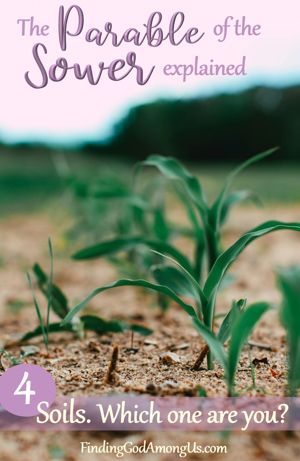When Jesus spoke in parables, they were sometimes confusing and difficult to put into relatable terms. However, in the case of the Parable of the Sower, Jesus gave us the meaning!
But still, how do we apply the parable to Christian life today? What type of soil are you? It’s in the self-assessment of these questions that we have the opportunity to make transformative changes in our lives.

The Parable of the Sower summary
In the Parable of the Sower (Matthew 13:1-23 is one version), a farmer went out to sow seeds. The seeds were scattered in different places: on a path, on rocky ground, among thorns, and in good soil.
The conditions under which the seeds fell determined whether they grew and how lasting and fruitful their growth was.
The Parable of the Sower Explained
Jesus used the Parable of the Sower (Parable of the Four Soils) to teach people that there is only one path that will produce fruitful growth to a true, beautiful, and lasting spiritual journey with God.
That is, planting your seed of faith in good, fertile soil and then nurturing it.
Parable of the Sower in the Bible Meaning
It might be confusing to understand how the Parable of the Sower relates to life as a Christian today, but Jesus explained the meaning in Matthew 13:18-23, Mark 4:13-20, and Luke 8:11-15.
18 “Listen then to what the parable of the sower means: 19 When anyone hears the message about the kingdom and does not understand it, the evil one comes and snatches away what was sown in their heart. This is the seed sown along the path. 20 The seed falling on rocky ground refers to someone who hears the word and at once receives it with joy. 21 But since they have no root, they last only a short time. When trouble or persecution comes because of the word, they quickly fall away. 22 The seed falling among the thorns refers to someone who hears the word, but the worries of this life and the deceitfulness of wealth choke the word, making it unfruitful. 23 But the seed falling on good soil refers to someone who hears the word and understands it. This is the one who produces a crop, yielding a hundred, sixty or thirty times what was sown.”
What are the 4 types of soil in the Parable of the Four Soils?
The four types of soil in the Parable of the Sower aren’t technically all soil. The seed the farmer scattered fell onto four different surfaces. They are: the path (no soil), rocky ground (little soil), among thorns, and good soil.
What soil each of these represents as well as their growth, or lack of growth, are covered next. It’s in these explanations that we can see where our seed lies in our spiritual journey.
What does the seed represent in the Parable of the Sower?
For starters, the seed represents the Word of God. What type of soil is in our hearts will determine whether the seed of God’s Word, love, and grace will flourish within us or not.
1. Seed that fell on the path:
The Seed that fell on the path is like God’s Word that falls on deaf ears – either because it isn’t understood or there is no effort to understand. The message never gets absorbed before it’s snatched away by the evil one.
Is your faith falling on the path? (Signs that your faith may be falling on the path are in BOLD)
- Do you pray from your heart or do you recite prayers from memory while your thoughts wander?
- Do you read the Bible? Do you reflect, learn, and grow from reading or does it feel empty?
- Is Jesus your regular companion or do you think about Him or pray weekly, or less?
2. Seed that fell on the rocky ground:
The Seed that fell on the rocky ground is like getting excited about your New Year’s resolution to lose weight, exercise, or stop smoking. You start off the beginning of the year with great enthusiasm but before long, it’s become a chore and it’s easier to forget the resolution and keep doing what you were doing last year.
Is your faith falling on rocky ground? (Signs that your faith may be falling on rocky ground are in BOLD)
- Do you make time for God in your busy schedule or do you give God time only if you have any left?
- Does your faith stand up to challenges and criticisms or does it crumble when tested by troubles or doubts?
- Do you go “all-in” for Jesus, then go for long periods where he’s hardly a thought?
3. Seed that fell among thorns:
The Seed that fell among thorns is like wanting something very badly, but letting other things keep getting in the way of accomplishing it. For example, wanting to spend more quality time with your family, but choosing to go for a drink with your coworkers instead.
Is your faith being choked out by thorns? (Signs that your faith may be choking on thorns are in BOLD)
- Do you take an honest look at your faith and strive to grow closer to God or are you satisfied with your current relationship with Him?
- Do you strive to lead God’s will for your life or do you get drawn away by worldly goals, like wealth, outward beauty, or status?
- Do you work on building your trust in God or do you get consumed by worldly worries?
4. Seed that fell on good soil:
The Seed that fell on good soil is like seeking Jesus with all your heart as He asked us:
You will seek me and find me when you seek me with all your heart. Jeremiah 29:13
Good soil makes Jesus a priority. It means making time for Him, rather than trying to squeeze Him into your busy schedule. It means pursuing a personal relationship with Him as you would pursue a relationship with a love interest – getting to know Him, speaking to Him often, trusting Him, making time for Him, and treating Him with love, kindness, and respect.
Seeking Jesus is an insatiable longing. The closer you get, the more you want to get even closer. This relationship spills over into the person you are, the way you treat others, and the way you live your life.
Is your faith falling on good soil? (Signs that your faith is falling on good soil are in BOLD. This time, BOLD is good!)
- Is God’s will the highest priority in your life?
- Is Jesus a regular part of your day, in your thoughts, prayers, actions?
- Do you want to learn more, do more, and be more for Jesus?
- Does your heart swell with Jesus and does it spill over into every aspect of your life?
So, what kind of soil are you?
The examples above are only to give you food for thought. Take some time to make an honest assessment. No one has to know your answers – and God already knows anyway!
What if you’re not good soil?
So, what if you’re not the type of soil you want to be? Use this as an opportunity to grow! Make an effort to Seek Jesus and find more ways to Fit Jesus into Your Busy Schedule.
God’s forgiveness is only a whisper away. He wants us to turn to Him and He’s ready and willing to shower us with grace and welcome us with open arms.
Today is a fresh start to plant your seeds in good soil.
This post may contain affiliate links. This is my full disclosure.

Are you seeking deeper faith, a more meaningful life, or greater inner peace?
Embark on a journey of spiritual growth and self-reflection through the timeless teachings found within the forty parables of Jesus Christ. Grab your ebook, softcover, or LARGE PRINT. Read FREE with Kindle Unlimited! Learn more on Amazon (affiliate link). Read a Sample!
More Parables!
Do you love the parables as much as I do? You may enjoy reading life lessons on these others (listed below), these activities for adults and children, or this list of Parables and Meanings. More parable lessons are underway. See them all HERE!
Do you love journaling? Does writing down your personal reflections help you process your thoughts more fully? Perhaps these Christian writing journals will be helpful as you reflect on the life lessons of the parables.
- 6 Lessons from Mustard Seed Faith
- 4 Parable of the Hidden Treasure Lessons
- 5 Life Lessons from the Parable of the Talents
- 3 Parable of the Lost Sheep Lessons
- The Parable of the Sower explained – which soil are you like?
- 4 Life Lessons from The Parable of the Ten Virgins
- 3 Life Lessons from the Parable of the Rich Fool
- 3 Lessons from the Parable of the Vineyard Workers
- Parable of the Lost Coin Spiritual Lessons
- The Parable of Two Sons – 3 Spiritual Life Lessons
- The Parable of the Weeds – 4 Spiritual Lessons
- The Parable of the Persistent Widow
- Lessons from the Parable of the Pharisee and Tax Collector
- The Parable of the Pearl Life Lessons
- The Parable of the Great Banquet Lessons
- Parable of the Shrewd Manager Life Lessons
- Parable of the Yeast Life Lessons for Today
- Parable of the Unforgiving Servant Life Lessons
- Parable of the Wedding Feast Life Lessons
- Parable of the Net Life Lessons
- The Parable of the Growing Seed
- The Parable of the Tenants Life Lessons
- Parable of the Fig Tree Life Lessons
- Lazarus and the Rich Man Parable Life Lessons
- Parable of the Good Shepherd Bible Lessons
- Parable of the Wineskins Spiritual Lessons
- Parable of the Wise and Foolish Builders Lessons
- Parable of the Faithful Servant Life Lessons
- Parable of the Lamp Life Lessons
- Parable of the Two Debtors Life Lessons
- Parable of the Householder Life Lessons
- Parable of the Friend at Midnight Life Lessons
- Parable of the Master and Servant Life Lessons
- Parable of the Watchful Servants Life Lessons
- Take the Lowest Seat Parable Life Lessons
- The Parable of the Prodigal Son Life Lessons
- 5 Parable of the Good Samaritan Lessons
- The Cost of Being a Disciple Life Lessons
Be the First to Know!
Do you love Christian inspiration and seeking Jesus? What about devotionals and Christian books? Come join my email community!
Photo by Markus Spiske on Unsplash